
John Rutter
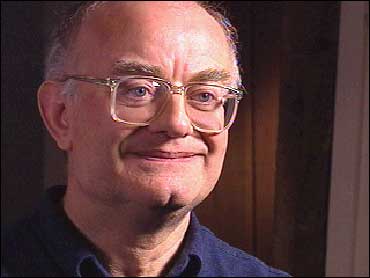


John Rutter was born in London in 1945 and received his first musical education as a chorister at Highgate School. He went on to study music at Clare College, Cambridge, where he wrote his first published compositions and conducted his first recording while still a student.
His compositional career has embraced both large and small-scale choral works, orchestral and instrumental pieces, a piano concerto, two children's operas, music for television, and specialist writing for such groups as the Philip Jones Brass Ensemble and the King's Singers. His most recent larger choral works, Requiem (1985), Magnificat (1990) and Psalmfest (1993) have been performed many times in Britain, North America, and a growing number of other countries. He co-edited four volumes in the Carols for Choirs series with Sir David Willcocks, and, more recently, has edited the first two volumes in the new Oxford Choral Classics series, Opera Choruses (1995) and European Sacred Music (1996).
From 1975 to 1979 he was Director of Music at Clare College, whose choir he directed in a number of broadcasts and recordings. After giving up the Clare post to allow more time for composition, he formed the Cambridge Singers as a professional chamber choir primarily dedicated to recording, and he now divides his time between composition and conducting. He has guest-conducted or lectured at many concert halls, universities, churches, music festivals, and conferences in Europe, Scandinavia, North America and Australasia. In 1980 he was made an honorary Fellow of Westminster Choir College, Princeton, and in 1988 a Fellow of the Guild of Church Musicians. In 1996 the Archbishop of Canterbury conferred a Lambeth Doctorate of Music upon him in recognition of his contribution to church music.
In 1984 Rutter formed his own record label, Collegium, in the hopes of bringing choral music to a wider audience through performances of the highest possible quality. "I just wanted a vehicle for the Cambridge Singers," he says, "and a way of recording the music I wanted, when I wanted, with whom I wanted, in the buildings I wanted, with the engineers and the producers that I wanted." Collegium has achieved great success and wide acclaim over the years. "There was a much larger audience worldwide for the sort of music we were recording than we had ever known. It's really, really heartening, because it shows that choral music is much closer to the center of people's affections than is often suspected." In addition to showcasing Rutter's own work, including his beautiful Requiem (1998), Collegium CDs feature a wealth of traditional and sacred music.
A healthy amount of the repertoire released on the Collegium label has to do with Christmas. When asked about his feelings on the holiday, Rutter replies, "For me, first and foremost, Christmas is happy memories of the way it was celebrated when I was a kid. As everyone would probably say, it revolves around the family and gatherings. But it also revolves around my school chapel. I was at a school in north London that happened to have a chapel with a fine choir. And our Christmas carol service was the high point of our singing year. So I actually developed a love of the whole music of Christmas, along with the message of Christmas, from when I was a kid. With music, your Christmas can always be perfect. With real-Iife Christmas, there's always something that's going to go a bit wrong. You're hoping it's going to snow on Christmas day, but it doesn't. Or your turkey smells absolutely gorgeous, but it turns out that it's a bit burned when you come to eat it. But the music of Christmas is always perfect, and so I love to remember and celebrate Christmas in music and song."
| Requiem Aeternam Out Of The Deep Pie Jesu Sanctus Agnus Dei The Lord Is My Shepard Lux aeterna Advent Anthem Anthem Musicca Dei Donum Two Blessings |
Rutter's Requiem, from 1985, is wildly popular among modern choirs, audiences, and record shoppers. It is offered here in the world premiere recording of its chamber version, making what is considered a concert piece more suitable for liturgical purposes or intimate venues. This, along with many of his other works, has a direct, uncluttered, almost folksy air to it, while hardly ever lapsing into banality. Just when you begin to think, "Ah, I've heard this kind of stuff before", up Rutter comes with some ingenious device or harmonic twist that grabs even the most jaded ear. And he knows how to hold such a comparatively larger-scale composition together, too. This is one of Rutter's finest and most convincing works. It consoles, implores, worships, affirms, reassures, and mystifies-everything that a good requiem is supposed to do. Instrumental accompaniment (single flute, oboe, cello, harp, and timpani, plus percussion) is spare, but expert and tasteful. Rutter has a long and fruitful history with the Clare College Choir, having led them himself in quite a few outstanding recordings. They perform here with their usual depth, sensitivity, technical finesse, and bright, clear sound.
| 8461 CD $14.98 |
| Mass of the Children Shadows Shadows |
Bringing together the voices of adults and children, Rutter's Mass of the Children is scored for mixed choir, soprano and baritone soloists, orchestra, and the irresistible charm of a children's choir. Rutter's skilful writing for these forces together with his sensitive interweaving of both the Latin Mass texts and Thomas Ken's renowned morning and evening hymns for Winchester College, gives the whole work the framework of a complete day, from waking to sleeping. This has resulted in one of his finest and most moving works to date.
| 8631 CD $9.95 |
| Gloria I : Allegro vivace Gloria II : Andante Gloria III : Vivace e ritmico Come down, O Love divine Lord, make me an instrument of Thy peace To everything there is a season I my Best-Beloved's am Praise the Lord, O my soul I will lift up mine eyes As the bridegroom to his chosen A Clare Benediction The Lord is my light and my salvation Go forth into the world Thy perfect love Te Deum |
Gloria (a concert work, despite the use of a religious text) was commissioned by the Voices of Mel Olson in Omaha, Nebraska, who invited Rutter to direct the first performance in 1974. The words come from the second section (the Hymn of Praise) of the Ordinary of the Mass, which in the liturgy follows the 'Kyrie'. The familiar opening words are those of the angels proclaiming the birth of Jesus, as found in the second chapter of Luke's Gospel. Rutter's setting is based largely on one of the Gregorian chants with which the text is associated. He describes the three movements as '… roughly corresponding to traditional symphonic structure', the mood of the sections being respectively '… exalted, devotional and jubilant by turns'. The use of organ, brass and percussion makes for plenty of Waltonian punch in the outer movements and yet also for a hauntingly ethereal middle section. 'Delicious performances of Rutter’s wonderfully approachable and finely crafted vocal writing. The sound, too, is outstanding' (Gramophone)
| 7989 CD $17.98 |
| Requiem Requiem aeternam Out of the deep Pie Jesu with ROSA MANNION soprano Sanctus Agnus Dei The Lord is my shepherd Lux aeterna with ROSA MANNION soprano Hymn to the Creator of Light God be in my head A Gaelic Blessing Cantate Domino Open thou mine eyes A Prayer of Saint Patrick A Choral Fanfare Draw on, sweet night My true love hath my heart The Lord bless you and keep you |
John Rutter composed his Requiem in 1985. The work follows the precedents of Brahms and Fauré in using carefully selected texts in place of much of the standard Missa Pro defunctis sequence. The resulting composition has an arch-like formal structure within which is contained some of Rutter's most haunting (and, in the case of 'The Lord is my shepherd', well known) choral music to date. Also included are two items from the Birthday madrigals collection composed in honour of the jazz pianist George Shearing, and eight further sacred works. The double-choir Hymn to the Creator of Light is a wonderful composition, far removed from the romantic style with which Rutter has sometimes been associated; 'A disc to delight all those who admire Rutter's choral writing. Full of delights and with something for everyone. Certainly a must!' (Organists' Review)
| 7991 CD $17.98 |
| Requiem Veni Sancte Spiritus What Sweeter Music Hymn To The Creator Of Light Cantate Domino Cantus Te Deum |
Perhaps Britian's very best choir performs the works of perhaps Britian's very best living choral composer. Certainly a wonderful match this pairing makes for a great recording and worthy of every fan's collection.
| 8301 CD $16.98 |
| I my Best Beloved's am Cantate Domino Musica Dei Donum Deck the Hall Hymn to the Creator of Light It was a lover and his lass Draw on, sweet night Come live with me My true love hath my heart When daisies pied The girl I left behind me O waly, waly The British Grenadiers Golden slumbers Dashing away with a smoothing iron Monday's child The Owl and the Pussy-Cat Windy nights Matthew, Mark, Luke and John Sing a song of sixpence |
Conductor and composer John Rutter has worked in many facets of music, but is best known for his work in the choral realm. On this recording his work is interpreted by the Nordic Chamber Choir led by Nicol Matt. This dynamic CD shows the stylistic and subject variety found in Rutter's music. The first set of five sacred pieces includes the amazingly beautiful wedding song, "I my Best-Beloved's am," which combines sacred Latin texts with an English love poem, the jubilant "Cantate Domino" and virtuosic "Deck the hall." The set of Birthday Madrigals, written for jazz pianist George Shearing combine madrigal era texts in very jazzy settings, three of them include double-bass. The recording is rounded out with five settings of traditional songs and five childhood lyrics.
| 7269 CD $15.98 |
| Shepherd’s Pipe Carol Nativity Carol There is a Flower Sans Day Carol What Sweeter Music I wonder as I wander Jesus Child Wild Wood Carol The very best time of year Away in a Manger Angel Tidings Christmas Lullaby Dormi Jesu Love came down at Christmas Star Carol Carol of the Children Mary’s Lullaby Silent Night Angels’ Carol Candlelight Carol Second Amen Donkey Carol |
The performances are uniformly excellent; Stephen Layton and his Polyphony vocal ensemble have shown a previous affinity for Rutter’s work and this effort simply reaffirms their commitment to and love for this very special music. Outstanding.
| 7992 CD $17.98 |
| Benjamin Britten - A Ceremony of Carols, op. 28 Procession Wolcum Yole! There is no Rose That younge Child Balulalow As Dew in Aprille This Little Babe Interlude In Freezing Winter Night Spring Carol Deo Gracias Recession John Rutter - Dancing Day - Prelude Angelus ad virginem A Virgin most Pure Personent Hodie Interlude There is no Rose Coventry Carol Tomorrow shall be my Dancing Day |
Voci Nobili’s second CD features British composers Benjamin Britten’s Ceremony of Carols and John Rutter’s Dancing Day. A Ceremony of Carols was inspired by “The English Galaxy of Shorter Poems”, and is written for treble voices and harp. The ‘carols’ are a product of 15th and 16th century writers, most of whom are anonymous. They retain their unique flavour by Britten’s extensive use of old English language in the style of Geoffrey Chaucer’s “Canterbury Tales.” The piece in its entirety shows Britten’s mastery of choral music, with each movement in contrast with the next. In Dancing Day, John Rutter employs the words and melodies of six traditional carols and resourcefully exploits their various rhythmic qualities in this cycle of for SSA voices with harp or piano accompaniment.
| 7859 CD $15.98 |
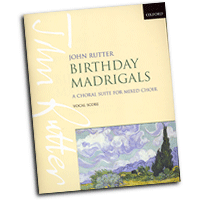 |
It Was A Lover And His Lass |
Birthday Madrigals was written at the invitation of Brian Kay, conductor of the Cheltenham Bach Choir, to celebrate the seventy-fifth birthday of the great jazz pianist George Shearing. The first performance was given, in his presence, in Cheltenham Town Hall on June 3, 1995 by the Cheltenham Bach Choir with Neil Swainson (double bass), John Rutter conducting. The seed of the composition was 'It was a lover and his lass,' witten in 1975. The other four movements, their texts also drawn from the madrigal era (hence the work's title), were added in 1995 to make the present choral suite.
| 9354 SONGBOOK $10.95 |
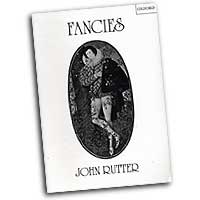 |
Tell Me Where Is Fancy Bred |
Featured on the Cambridge Singers' album of the same name, 'Fancies' is an exquisite cycle of choral settings for mixed voices and small orchestra.
| 9357 SONGBOOK $14.95 |
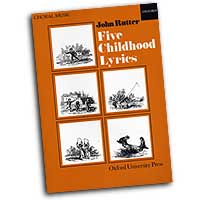 |
Monday's Child |
This choral collection includes settings of children's poems and nursery rhymes for SATB unaccompanied - with some divisi.
| 9352 SONGBOOK $12.95 |
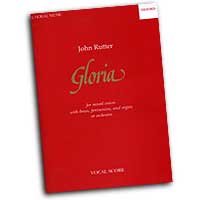 |
Allegro Vivace |
Composed by John Rutter, this vocal score for mixed voices and piano is a brilliant choral piece that your singers and audience members will love. The score comes with choral notation and piano reduction, the text language is Latin, with a total of 44 pages.
| 9360 SONGBOOK $9.95 |
This excellent choral collection by John Rutter is written for mixed voices and keybord. The nine movements form a single choral work comprising seven pieces previously published separately and two new movements. A broad range of emotions all find their place with rich and varied musical settings. It features solos for soprano and tenor soloists - an excellent addition to your sacred choral program!
| 9361 SONGBOOK $11.95 |
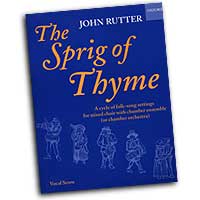 |
The Bold Grenadier |
Featured on the Cambridge Singers' album of the same name, 'The Sprig of Thyme' is a beautiful cycle of folk-song settings, each setting giving plenty of opportunity for different voices in your choir the opportunity to shine!
| 9362 SONGBOOK $11.95 |
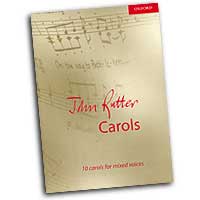 |
Angels' Carol |
This excellent collection of some of John Rutter's oringal Christmas carols is a must-use for any choral Christmas program.
| 9353 SONGBOOK $9.95 |
Editied by John Rutter these songs come from the British Isles and North America, ranging widely in regional origin and character.
| 6606 SONGBOOK $15.98 |
Editied by John Rutter all these songs come from the British Isles.
| 6607 SONGBOOK $15.98 |
This songbook is part of the Oxford Choral Classics series and gathers in one volume sixteen of the finest motets and related pieces for the season of Christmas. The collection gives due space to the magnificant works of the Renaissance period, with well-known motets such as Victoria's O magnum mysterium and Sweeelink's Hodie Chritus natus est placed alongside works by Byrd, Palestrina and Mouton. There are also works from later peiods, including Bruckner's Virga Jesse, an estatic motet in praise of Christ's birth, and Cui's fervant and sonorous setting of the Magnificat. As such, the collection is an outstanding and richly varied survey of the repertoire, and provides a superb choice of pieces for all choirs seeking a broad selection of music for this season.
| 6608 SONGBOOK $10.95 |
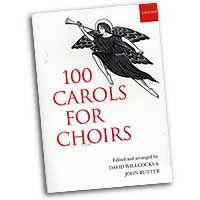
This is a selection of the best-loved carols and hymns for Advent, Christmas, Epiphany, and Easter: 74 of the most popular titles from Carols for Choirs 1, 2 and 3, plus 26 titles new to the series. There are carols suitable for both sacred and secular occasions, and both accompanied and unaccompanied material. The Order of Service for a Festival of Nine Lessons and Carols is included.
| 9086 SONGBOOK $18.95 |
An Interview With JOHN RUTTER (Classic Magazine)
Britain's best loved living composer? Quite possibly. John Rutter tells Jeremy Nicholas about the attractions of America, staying out of the critical firing line and taking a peek at John Tavener's notes at school…
IIf you sing in a choir - church or choral society - it is a mathematical certainty that you will have sung something by John Rutter. Be it anthem, carol, hymn or his much-loved Requiem, John Rutter's choral man who has given choirs music is ubiquitous. It is now part of the fabric. Singers will tell you 'Oh, we're doing the Rutter this year' just as casually as they might say 'we're doing the Faure'(in the Requiem's first six months, no less than 500 orchestral parts were hired in America alone). It was Rutter's music that opened the service of thanksgiving for the centenary of Queen Elizabeth, the Queen Mother at St Paul's Cathedral in July; it was another Rutter work which closed it. He is a great-grand-pupil of that other great choral composer Sir Charles Villiers Stanford, a fact of which he is justly proud. While he continues to compose, the English choral tradition stretching back to Byrd and Tallis is in safe hands. Here is man who has givren choirs all over the world some of the most accessible and beautiful liturgical works of the last 40 years, standing resolutely against the ghastly. musical inanities of the charismatic movement.
In addition to his composing activities he is a shrewd businessman with publishing and recording interests. His own works are recorded and published but he has his finger on the pulse when it comes to what choral societies need in general. A few years ago he compiled for Oxford University Press a huge volume of popular opera choruses so that societies could do their "opera gala nights" with reference to just the one book rather than sourcing individual publishers for complete opera scores. In a country that used rightly and routinely to award knighthoods to the organists of our major cathedrals, it says something of changing priorities and the British attitude to music that Rutter's name has not appeared on any honors list. Though it will embarrass such a modest man to read this, the lack of official recognition for John Rutter is a disgrace.
IN: The R.E.D. Classical Catalogue lists nearly 70 recorded Rutter works.
JR: Golly!
Far more than most of your contemporaries. And the most recorded is Shepherd's Pipe Carol.
[laughs] Gosh. I'd no idea. Well, the Shepherd's Pipe Carol was almost the first thing I wrote that was published. Every composer wants to write the Great Masterpiece but I started the opposite way round. I wasn't experienced in writing in big forms, so I thought if I write something big and ambitious at eighteen - which I was at the time -it will probably fall flat on its face. If I start small, then even if it's terrible, it will only be terrible for three minutes. I was in the choir at my school in High gate, North London, at an absolutely incredible time. Among my immediate contemporaries were John Tavener, Nicholas Snowman who now runs Glyndebourne, Howard Shelley, David Cullen, who's Andrew Lloyd Webber's orchestrator and a string of others.
What came out of that was that it seemed natural to compose -and we all did. The annual carol service was a highlight -John [Tavener] and I would write a carol each year and compare notes -so carols and singing were part of the furniture. That's where the Shepherd's Pipe Carol came from.
You went to Cambridge where Sir David Willcocks must have been an influence?
Oh yes. I was a member of his harmony and counterpoint class and after one such class he asked me to stay behind at the end, and I thought 'Oh God what have I done wrong?' And he said [good imitation of Sir David] '1 understand you've been writing some Christmas carols. Would you bring them to my rooms tomorrow morning? Shall we say nine o'clock?' So I went along shaking like a leaf, thinking he was going to ask me to leave the country, and he looked over these manuscripts which included the Shepherd's Pipe Carol and he said 'Would you be interested in them being published? ' And I really was gob smacked. He was an editor with the Oxford University Press. Well, two days later they offered me a contract and they have been my publishers ever since. That was in 1967. So not only was David an influence like that, but I learned a great deal from him and we remain friends to this day.
And he taught you something about being a businessman'?
I never meant to be. I conducted my first recording in 1966 for EMI while I was a student at Clare College -in fact it's still in the catalogue [Carols from Clare]. I made some other records but never had a 'home' label. When I was Director of Music at Clare in the mid-1970s, we were the very first mixed chapel choir in the University. I left in 1979 after four very happy years because I simply did not have enough time to compose, but didn't realize how much I would miss having a regular choir. That's how The Cambridge Singers came about, singers with the common background of Cambridge, and by having my own label, of course I had more control over what was recorded and how.
What inspired the repertoire for your latest release?
It's really a personal collection of favorites, ones that have been with me, in most cases, since I was a kid and which are part of my mental furniture. I wanted to express how I felt about the richness of this legacy.
It's a wonderful mix of styles and textures -and you do some tremendous last verse harmonies
[laughs] Well, when you've got a big hymn on a festival occasion, it should be just like the cup final with that crescendo at the end!
Were your parents musical?
No, my father was an organic chemist and my grandfather was a marine engineer in Newcastle-on- Tyne. My mother wanted to be an actress and was said to have some talent, but after the war, you know, kids came along, so she stayed home.
Brothers and sisters?
I have a sister who is a translator. 10 years younger than me, so I was quite a solitary child. But my parents had an old upright in the flat which was only there because it was too big to get downstairs. I think it had been winched in through the window -it belonged to a previous occupant -and they couldn't get it out. And I used to climb up and play this thing -and ordinary old steam piano -not scales and arpeggios like you're meant to, but my own tunes. I would go into a kind of fantasy world and improvise these little pieces for hours and hours, singing and playing on my own, immensely happy. And then I also sang in the choir at Primrose Hill. So the music came from church and school, not family.
Tell me about the director of music at High gate, Edward Chapman [ 1902-81 I. He sounds like an extraordinary man.
Yes. He came from very humble origins, won a scholarship to Pembroke College in the 1920s, studied with Dr Charles Wood [a pupil of Stanford], and put himself through the FRCO without any tuition. He very quickly went to High gate where he stayed for 40 years. Under him we regularly won. Let The People Sing, we sang in the first Mahler cycle in the 1960s under Berthold Goldschmidt, bless him, and then ]ascha Horenstein. We sang on the historic recording of the Britten War Requiem [in 1963] with Fischer-Dieskau, Galina Vishnevskaya and Peter Pears and conducted by the composer in King sway Hall.
You're very thin on the ground as a conductor over here.
I don't do it. On purpose.
But you do In America.
I get asked to conduct a certain amount abroad and I happily do that. But then I like to come home and keep a low profile, because composers work in the shadows and that's fine. And if I started ail that stuff of getting an agent and soliciting conducting work, then, assuming that agent was successful, I would find my time being .swept up with conducting -and that's something I don't want to do.
Then what tempts you over to America?
Well, the conditions are wonderful. And I can go over and be someone else for a few days and then come home and be private. That suits me very well -I enjoy conducting, I enjoy audiences, the excitement and risk of performance, but I wouldn't want it all the time. Too much of it and I wouldn't get much composition done. Plus people in Europe have a suspicion of all-rounders and, here, I don't want to confuse the focus of what I do.
Is that also a kind of self-defense against the attitude to your music in this country from certain quarters?
I do think that the sort of music I write tends to get attacked by the critics -if they take any notice of it at all -because it is too accessible. The fact is that I purposely write in a fairly straightforward way, so that whatever I'm saying, you can tell what I'm saying first time. I thought a very long time ago I would devote my energies to writing the sort of music that doesn't get reviewed, so I've kept out of the critics way and they've kept out of mine. Even though there's been a change and more accessible music is now acceptable, I don't belong in the concert world. But that leaves me with a lot of areas in which I can operate -, practical church music, choral music, music for schools, even a flirtation with the media. I Thoroughly enjoyed writing for TV back in the 1970s. But it's difficult to do both. Richard Rodney Bennett's managed it -and, incidentally, I do think it fascinating that he has taken refuge in New York, Harrison Birtwistle in France and Maxwell Davies on a remote Scottish island.
Is there a musical establishment that they want to get away from?
What are they afraid of? Is it something unfriendly at the heart of the British musical establishment? I don't say I've run away, but I've kept out of the way of the firing line. I'm all for a spectrum in the end. We all have a place and I think everybody deserves a hearing. I think it's a shame if the tide of fashion is against you, so you feel it's useless to compose because you're just going to get attacked or belittled for it. I knew William Walton slightly and he was deeply, deeply hurt -almost crippled as a composer -by the attacks that had been made on him.
You've said that you never wanted 'to write music that would be remarked upon for its originality'. Nevertheless, there is a distinct Rutter sound. How would you characterize it?
Well, someone said to me just last week -we were performing my Requiem which, by the nature of its subject, is contemplative - she said, 'It's funny, your music makes me cry but they're not unhappy tears. Even in the sad bits there seems to be a sense of joy and solace', Someone else said, 'Your music touches peoples' hearts', If that were true, the two nicest compliments would be that and, even if someone didn't like my music, to say I was a good craftsman
Choirmaster John Rutter is an English composer who writes more Christmas carols and choral music than just about anyone on earth. CBS Correspondent Vicki Mabrey found the maestro in a small church in Edinburgh, Scotland, giving singing lessons.
“You don’t realize how good it is until you’ve tried it,” says Rutter. “It is wonderful to go to a choral concert, to hear a choir sing. But I think the deepest joy of all is to actually sing.”
Rutter holds these singing days about 20 times a year. “When I agree to do these, I make just one condition, which is that anybody is welcome,” he says. “So long as they are willing to come and bring their voice, they’re welcome.”
The cost of admission: donation to charity. Singing lessons from the master: priceless.
After a full day of tinkering, fine-tuning and some candid critique, these people – who’d never sung together – sounded amazing.
How does Rutter get the sound that he wants? “Communication through body language or through face language perhaps seems to take over,” he says. “There’s a kind of alchemy or magic and if I probe into it too deeply maybe I’ll lose it.”
His requiem was performed recently at Trinity Church in Boston. His works, large and small, are known for their sing-ability. And it begins with just him and his grand piano at this cottage hidden in the English countryside. This is where the extrovert turns inward.
Rutter is first and foremost a composer. He writes a lot of his own lyrics, but also combs books of old poems and sets them to music. He spends hours alone here, playing with sound. But Christmas carols are his trademark. They’re especially popular here in America.
What is it about his music that appeals to people, especially in the heartland of America?
“Maybe it touches people's hearts … perhaps that's why it gets so widely done,” says Rutter.
He’s a prolific writer of carols – that’s where he makes a good deal of his money. And his latest was for the choir at Washington’s National Cathedral. After just five days of composing, Rutter sent “Rejoice And Be Merry” to Washington, where it debuted last week.
“That’s the moment we all live for, because when you sitting composing something, there’s the sheet of paper and there’s the perfect tape playing in your head of the piece that you’re writing,” says Rutter.
“But anybody watching you hears nothing. And of course, you write it down and then you pass that along to the performers and when you have that magic moment you just give them the downbeat and baaah!” Rutter was a musical prodigy, and he was writing at the family piano before he was old enough to go to school. His musical talent gained him entry to Cambridge University, and the choir at Clare College.
Choirs are a tradition at Cambridge, and their haunting chords have echoed across the campus for centuries. Rutter not only sang, he wrote his first works while he was a student. These works caught the attention of his professor, Sir David Willcocks, one of England’s most renowned choir directors.
“I think he was the most gifted composer of his generation. And he showed remarkable facility at an early age,” says Willcocks, who gave Rutter his big break, and convinced Oxford Press to publish his work.
“They thought, ‘Is it right to have such a young man?” So I said, ‘Yes, believe me, you’ll be proud to be associated with him in years to come.’”
One of Rutter’s first hits was “The Shepherd’s Pipe Carol,” written when he was just 19.
But not everyone loves his music. He’s been criticized, especially in England, for being too saccharine – tunes so sweet, as one critic said, that they were all but trail fairy dust.
“Some people say, ‘Well that’s too much heart-on-sleeve.’ Or, ‘You know, there’s not enough there,’” says Rutter. “What can you say? You can’t please everybody. It should be written in gold letters above every composer’s bed.” Although he’s gained an international reputation, Rutter’s career has centered around Clare Chapel and its choir.
For several years after college, he was the choir director. He got married there, and his oldest son, Christopher, was baptized there as well.
Christopher followed in his father’s footsteps, and sang in the choir. But in 2001, right after choir practice, Christopher was struck by a car and killed - it happened just outside Clare Chapel. His funeral was held a week later, in Clare Chapel.
“The sadness, of course, never goes. Anyone who’s been bereaved knows you never really get over it,” says Rutter. “I think anybody who’s experienced what our family has knows that it draws you closer together, and perhaps from that closeness comes a sense of inspiration.”
For two years, Rutter couldn’t find the inspiration. But when he finally emerged, he wrote “Mass Of The Children.”
And although he plumbs the bible for many of his lyrics – surprisingly, he says he’s not a religious man: “I don’t think you have to be religious, or at any rate to seek promote religious faith, to write good religious music.”
So does this mean that he’s more spiritual than strictly religious?
“Yes, I think that's how I would put it,” says Rutter, who has kicked off the holidays rehearsing choirs for a performance of Handel’s Messiah at Carnegie Hall. In the next few weeks, during his busy season, he will visit great halls and churches from America to Europe to the Caribbean.
“I love Christmas. It’s the child in me,” says Rutter. “Maybe I’ve never quite grown up. I still feel just for those few magic days a year, that we have the world as it might be.”
© MMIII, CBS Worldwide Inc. All Rights Reserved.
![]() Choral - Home | Mens Choral | Womens Choral | Mixed Choirs | Early Music
Choral - Home | Mens Choral | Womens Choral | Mixed Choirs | Early Music
Childrens Choir | Boys Choirs | Girls Choirs | Choral arrangements | Choral Christmas | Director's resources
African | English | Canadian | Bulgarian | Estonian | Hungarian | Scandinavian | Russian | Latin American
Spirituals | Madrigals | Budget Choral titles | DVDs | Complete choral list
![]() RSS Feed - Choral New Releases
RSS Feed - Choral New Releases
Vocal Jazz | Doo Wop | Contemporary | Barbershop | Christian | Collegiate | World | Choral
Patriotic | The Groups | The Directors | The Vocal Coaches | Choral Development
Arrangements | Vintage Harmony | Christmas | DVDs | Instructional for Singers
The Harmony Sweepstakes A Cappella Festival
![]() RSS - New Releases
RSS - New Releases
Site Map | A Cappella News | Regional Newsgroups | RSS a cappella feeds
To find a specific song on any recording (or to find recordings by group name or CD title),
pick the search method and type the item you are searching for here:

All Rights Reserved All Content, page design, CGI Copyright © United Singers International